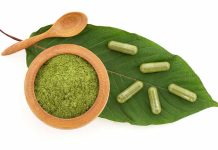Have you been feeling a little gassy and bloated lately? You wouldn’t relate it to your Kratom consumption but believe it or not, that could be the cause. Any extract with active ingredients that react with your body is capable of bringing about an unwanted side effect. And Kratom is no different. So, is it possible that the gas and bloating that you feel could be caused by kratom? Let’s find out!
Does Really Kratom Initiates Bloating
Bloating refers to the feeling of your belly feeling very tight and complete. This is often caused by gas being trapped in your guts. Therefore, bloating and gassiness are two conditions that often go hand in hand. This gassiness, also called flatulence, combined with bloating can cause significant pain and is a very uncomfortable condition to be in.
So how does Kratom cause bloating? Kratom is known to act with some specific receptors in your brain. This results in pain relief, but that’s not all that happens. The same receptors that allow ease from pain, also slow down the movement in your large intestine. Due to this, the food remains in your guts for longer than it usually would, taking much longer to digest. This leads to other uncomfortable conditions such as cramps and constipation.
While this is one way for Kratom to directly cause your stomach to bloat, there are a few other reasons your Kratom intake may be bloating you. Fortunately, unlike this process, the other factors that cause Kratom bloating can be controlled to resolve the issue.
Other Factors That Lead To Bloating With Kratom
Other than the direct impact on your central nervous system, there are five other reasons why your Kratom consumption may be causing you to bloat. Here is how you can tackle them.
Why You Should Never Have Kratom ON An Empty Stomach
A lot of people taking Kratom for the first time are advised to take it on an empty stomach. This is usually to feel the effects of it faster than you would on a full stomach. However, this is not advisable from a professional point of view because you can never predict your body’s response to the active ingredients.
What to Do?
So, how should you take Kratom? Ideally, one should take Kratom about half an hour after a light meal. It would be better if the meal is plant-based. This will help ease the Kratom bloating if you were previously taking Kratom on an empty stomach.
If you feel like taking Kratom on a full stomach rather than an empty stomach does not produce the desired effects, you should try using Kratom extract instead of Kratom powder. A significantly smaller dose of Kratom extract can produce more pronounced effects.
Taking High Doses
The amount of Kratom you consume can also have an impact on your gut health. If you are taking larger doses of Kratom than recommended, you have likely been feeling bloated because of it. Any dose of Kratom, more than 7grams, is bound to bring a series of side effects knocking on your door.
As mentioned earlier, the consumption of Kratom slows down the movement in your gut. A larger dose will result in a more significant decline. The result will be a heavily bloated stomach, and cramps that you do not want to deal with.
What To Do?
In this case, it is crucial to remember that moderation is the key. Try to lower your Kratom intake and bring it to a dose that you feel works best for your body. Ideally, a dose of Kratom ranging between 3 and 5 grams taken on a half-filled stomach will do the job of eliminating the bloating issue.
The Appetite Suppressing Property Of Kratom
Another side effect of Kratom is that it suppresses appetite. Consuming Kratom makes you feel full, regardless of your food intake, making you not want to eat. This can lead to your digestive system slowing down and producing gas. The gas can then build up and make you feel bloated.
What To Do?
Tackling this situation is quite simple. All you need to do is keep track of how much you are or are not eating. Make sure that you take the normal three meals per day and do not go on an empty stomach for too long. Along with food intake, keep yourself well-hydrated and you will be good to go.
Anti-Diarrheal Properties
The anti-diarrheal properties that Kratom possesses are very similar to those of medicines used for treating diarrhea. The most notable of these properties is its tendency to slow gut movement. When the food is in the intestines for a longer period, water can be reabsorbed from it, leading to less watery stools.
However, the longer the food sits in the gut, the more gas is produced, which begins to accumulate and cause pain, bloating, and constipation.
What To Do?
While there isn’t much that you can do to interfere with the process, you can try and avoid the results of the process. You can do this by taking plenty of water, to help keep your stools watery enough to pass, and not cause constipation. It can also help to get a relaxing abdominal massage, as that will help with the cramps and bloating. However, if none of this works, it may be a good idea to see a medical professional and get their help.
Stomach Gas Promoting Strains
Not all Kratom is the same. Kratom comes in a variety of strains and vein colors. All of these varieties vary greatly and produce different effects on the human body. This is because of the difference in the ratio of the active ingredient present in each variety.
Strains with a higher index of Kratom active ingredient are known to be more stimulating. They also slow down your stomach more than the other strains. White vein Kratom is one such variant that is known for its higher level of stimulation.
What To Do?
The solution here is easy. All you need to do is do your research before you decide to start consuming a certain variety of Kratom. Strains like White Thai, White Elephant, and White Maen Da should be avoided if you think Kratom makes you bloated. However, watch how your body reacts when you consume a specific strand of Kratom. This will help you understand which strand your body tolerates the best.
Low-Quality Kratom
Kratom is not the cheapest substance on the market and it might end up weighing a little heavy on your pocket. To make the purchase more affordable, people often opt for cheaper options. While this may seem beneficial to you, it can end up costing you more.
Kratom that is available for a cheaper price is probably low-quality kratom. This low-quality product is often known to be contaminated by several substances that can mess with your gut health. Therefore,
What To Do?
Don’t settle for substandard products. Make sure that the Kratom vendor that you purchase from us is not only well-reputed and reliable but also GMP-certified. It is ideal if you can obtain reports of lab tests on the Kratom from a third party, available on their website. This is how you ensure that your seller is giving you nothing less than top-quality Kratom with no additives or contaminants.
Underlying Medical Conditions
While Kratom does cause gas and bloating in some individuals, it is not the same for all. Some Kratom users may experience gas and bloat more severely than others. This could be because of an underlying medical condition that alters the effect of Kratom on the body.
What To Do?
If you have any sort of medical condition, make sure you do your research on how the effect of Kratom on your body can vary, because of it. You may experience more pronounced side effects because of it, and it is always better to stop your Kratom consumption until you understand the interaction between the extract and your medical condition.
Remedies For Treating Kratom Bloating
While some factors that cause Kratom bloating can be avoided, they can’t always be worked around. So if you are having trouble with Kratom bloating, here are a few remedies that you might find helpful.
1.Usage Of Clove Oil
Clove oil is often used in many recipes around the world and is known to possess several health-benefiting properties.
How To Use?
Mix 2 to 5 drops of clove in eight ounces of lukewarm water. Drink the mixture whenever you feel bloated.
2.Probiotics
Probiotics are a mix of healthy bacteria that promote your gut health. A study shows how beneficial probiotics can be for gas, bloating, and cramps. Lactobacillus and Bifidobacterium are two of the most effective probiotics for gut health.
How To Use?
Yogurt and Kimchi are known to contain probiotics that can help you get rid of bloating and gas caused by Kratom. If you do not want to take any of these, there are also sachets of probiotics available over the counter that can be mixed with water to drink.
3.Workout
Exercise has been known to be a great remedy for gas and bloating. Getting into the routine of doing at least 20 to 30 minutes of walking after an hour of your last meal can help you get rid of any gassiness and bloating. It will not only help you get rid of your current gas and bloating but also boost your metabolism and help you avoid the issue in the future.
4.Usage Of Apple Cider Vinegar
Apple cider vinegar promotes the process of digestion in your body and raises the level of acid in your stomach, which eventually leads to the elimination of bloating. Therefore, it is a great remedy for Kratom bloating.
How To Use?
Mix one spoonful of apple cider vinegar in a glass of lukewarm water. Make sure to take this mixture three times a day, before each meal till your symptoms are gone.
5.Usage Of Chamomile Tea
Chamomile tea, while known for its relaxing and calming effect, also has many other benefits. One of these benefits is promoting a healthy gut environment. It can help reduce gas and bloating and relieve stomach cramps.
How To Use?
Prepare and consume a cup of chamomile tea before each of your daily meals. Try to put a gap of about 30 minutes between your tea and dinner for ideal results.
6.Peppermint
Results of the research show that peppermint, in various forms such as tea and supplements, can help eliminate the symptoms of Irritable Bowel Syndrome (IBS). These symptoms are very similar to those of Kratom bloating. Therefore, peppermint is of help in both cases.
How To Use?
You can take peppermint in your preferred form, tea, or supplements, before each meal to observe the best outcomes. However, it is important to consult your doctor before taking peppermint since it can interact with several other medicines and alter their effect on the body.
7.Activated Charcoal
Activated charcoal is known to work wonders for accumulated gas in the guts. These supplements come with specific instructions that tell you exactly how and when to consume them for the best results.
User Suggestions For Kratom Gas And Bloating
It is always ideal to take suggestions and advice from someone who has gone through a similar experience and found a way out. There are several Kratom users online who have given great advice to other Kratom users on how to take Kratom and how to tackle its side effects.
As per a Reddit review by a Kratom user, bloating and gas are very commonly experienced by those using the extract for the first time. Therefore, it is not something you should be very worried about. It is also said that drinking Kratom tea will allow you to avoid the digestive issues that you are likely to face while using the toss-and-wash method for Kratom.
Another Kratom user online has explained how the popular method of taking two activated charcoal tablets along with two 180mg simethicone can help with not only bloating but also gas caused by Kratom.
Conclusion
Kratom, like any other herbal extract, can react with the body to produce unwanted side effects. However, these side effects are nothing to be afraid of, since they are usually not very severe, and can easily be treated. Make sure to do your research before you decide to buy a specific Kratom strain from a specific vendor. Also, do your research on a safe dose of Kratom and the right way to consume it. These are small things that will make all the difference.








